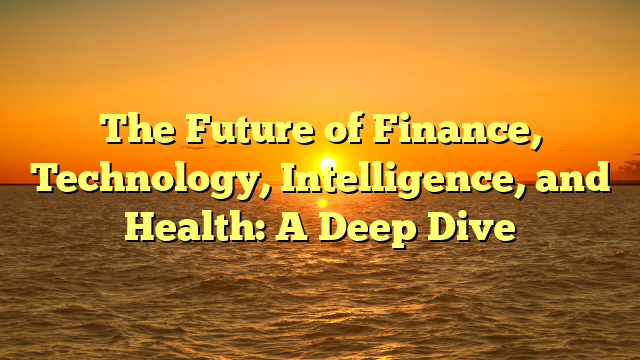
—
In today’s rapidly evolving world, financial systems, technology, human and artificial intelligence, and healthcare are intertwined in ways that are transforming every aspect of our lives. As these fields continue to evolve, they are reshaping economies, societies, and individuals. cengli88.net explores the impact of these developments, their intersections, and how they are shaping our future.
1. The Evolving World of Finance
The world of finance has undergone a dramatic transformation over the past few decades, largely due to technological advancements. From the rise of cryptocurrencies and blockchain to the increased reliance on artificial intelligence in trading algorithms, finance is becoming faster, more efficient, and less reliant on traditional banking systems. The development of digital currencies such as Bitcoin, Ethereum, and others has changed how people think about money, investing, and transactions.
Blockchain technology and digital currencies are paving the way for decentralized finance (DeFi), which offers a peer-to-peer model of transaction processing. In DeFi, people can access financial services such as lending, borrowing, and investing, without needing to go through traditional intermediaries like banks. This system promises to lower costs, reduce barriers to entry, and democratize access to financial services.
2. The Role of Technology in Healthcare
Technology is revolutionizing healthcare in ways that were unimaginable just a few decades ago. From telemedicine and wearables to AI-driven diagnostics and personalized medicine, advancements in technology are enhancing the quality of care, increasing accessibility, and reducing costs. One of the most exciting innovations is the development of artificial intelligence to assist with diagnosing diseases and predicting patient outcomes.
Wearable technology is also having a significant impact on healthcare. Devices such as smartwatches and fitness trackers allow individuals to monitor their health in real-time, providing valuable data that can be used by healthcare providers to create tailored treatment plans. This real-time health data is also useful for early diagnosis and intervention, especially for chronic conditions like diabetes or heart disease.
3. The Intersection of Artificial Intelligence and Intelligence
AI has become a transformative force in the modern world, impacting a variety of fields, including healthcare, finance, and education. The ability of AI to simulate cognitive functions such as learning, reasoning, and decision-making has opened up new possibilities for automation, optimization, and innovation. For example, in healthcare, AI-driven systems can analyze vast amounts of medical data to provide more accurate diagnoses and treatment recommendations.
The combination of human and machine intelligence is also known as augmented intelligence, and it has the potential to enhance human capabilities in ways that were once thought to be science fiction. AI can help humans process information faster and more accurately, enabling more informed decisions in critical fields like healthcare, finance, and law. As this technology evolves, the line between human and machine intelligence will continue to blur, offering new opportunities for collaboration and growth.
4. The Impact of Technological Advancements on Mental Health
The rapid advancement of technology has brought both positive and negative consequences for mental health. On one hand, technology has provided new avenues for therapy, mental health support, and social connection. Online therapy platforms, mental health apps, and virtual support groups allow individuals to access help without the stigma or inconvenience of in-person visits.
On the other hand, excessive use of technology, particularly social media, has been associated with negative mental health outcomes. Studies have shown that the constant exposure to idealized images and lifestyles on platforms like Instagram and Facebook can lead to feelings of anxiety, depression, and low self-esteem. Additionally, the rise of online bullying and cyber harassment has added to the mental health burden, particularly for younger individuals.
5. The Future of Health, Technology, Finance, and Intelligence
Looking ahead, the convergence of technology, finance, intelligence, and health is set to redefine our world. The integration of AI into financial markets, healthcare, and even educational systems is poised to unlock new levels of efficiency, accessibility, and personalization. Whether through personalized medicine, decentralized finance, or intelligent healthcare systems, the future promises a more interconnected and intelligent world.
The future of healthcare will likely include personalized treatments powered by AI and machine learning, as well as advancements in biotechnology that will allow for tailored medications and therapies. In finance, the trend toward decentralized systems and blockchain technology will continue to disrupt traditional banking models, offering more equitable and secure options for individuals around the globe. By integrating technology and human intelligence, the future of these fields promises a more sustainable and advanced world.





